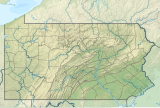| Tournament information | |
|---|---|
| Dates | June 14–17, 1927 |
| Location | Oakmont, Pennsylvania |
| Course(s) | Oakmont Country Club |
| Organized by | USGA |
| Format | Stroke play − 72 holes |
| Statistics | |
| Par | 72[1] |
| Length | 6,965 yards (6,369 m)[2][3] |
| Field | 148 players,[3] 62 after cut |
| Cut | 163 (+19) |
| Prize fund | $2,000 |
| Winner's share | $500 |
| Champion | |
| 301 (+13), playoff | |
The 1927 U.S. Open was the 31st U.S. Open, held June 14–17 at Oakmont Country Club in Oakmont, Pennsylvania, a suburb northeast of Pittsburgh. Tommy Armour defeated Harry Cooper in an 18-hole playoff to win the first of his three major titles.
The surprise second round leader was amateur Jimmy Johnston,[4][5] who won the U.S. Amateur two years later in 1929. In the third round on Thursday morning, he suffered two double bogeys on the front-nine, carded an 87 (+15), and finished in 19th place. Gene Sarazen, Walter Hagen, Bill Mehlhorn, and Emmet French were all in contention in the final round, but only French managed to break 40 on the back nine. Tommy Armour shot a final round 76 and 301 total, while Harry Cooper shot 77. Armour needed a 10-foot (3 m) putt for birdie on the par-4 18th to tie Cooper and force a playoff.[2][6] Neither player managed to break par during any round in the tournament.[7][8]
Both players were tied after nine holes of the Friday playoff, even though they only halved one hole. Cooper then took a two-shot lead, but an Armour birdie at 13 and a Cooper bogey at 15 brought the match to all square. On the 16th, Cooper found a bunker off the tee and recorded a double bogey, while Armour made par to gain a two-stroke advantage did not relinquish. Armour finished with a 76 to Cooper's 79.[1][9]
Armour's winning score of 301 was the highest since 1919, and the last time the winning score exceeded 300 strokes. Only one round under 70 was recorded, Al Espinosa's 69 in the final round. After Armour, no foreign-born player won the U.S. Open for another 38 years, until Gary Player in 1965. England's Ted Ray, the 1920 champion, played in his first Open since his win; it would also be his last. The 12th hole at Oakmont measured 621 yards (568 m), the longest in U.S. Open history until 1955.
While Armour won two more majors, Cooper never won one. His 31 PGA Tour victories are the most by a player without a major win, and he is often cited as the "best player to never win a major."
Defending champion Bobby Jones and Eddie Jones shared low-amateur honors and tied for eleventh. It was the only time in his eleven U.S. Open appearances that Bobby Jones finished outside the top ten.
This was the first U.S. Open held at Oakmont, which hosted its ninth in 2016. It has also hosted three PGA Championships; the first in 1922 was a match play event won by Gene Sarazen.
This was the last U.S. Open to commence on Tuesday; the following year the first round was scheduled for Thursday.
- ^ a b Gould, Alan (June 18, 1927). "Tommy Armour Open Champ". Milwaukee Sentinel. Associated Press. p. 1-part.
- ^ a b Shefter, David (February 28, 2007). "Getting their due: Jones, Parks, Hogan tasted victory at Oakmont". USGA. Archived from the original on June 25, 2016. Retrieved May 19, 2016.
- ^ a b Rohm, Harland (June 14, 1927). "148 golfers to start play in U.S. Open". Chicago Daily Tribune. p. 25.
- ^ Brown, Warren (June 16, 1927). "Johnston on top in Open golf tourney". Milwaukee Sentinel. Universal Service. p. 1, part 2.
- ^ Rohm, Harland (June 16, 1927). "Johnston leads U.S. Open play with 147 total". Chicago Daily Tribune. p. 15.
- ^ Rohm, Harland (June 17, 1927). "Armour ties Cooper for National Open title". Chicago Daily Tribune. p. 17.
- ^ "Cooper and Armour play off today for U.S. golf laurels". Montreal Gazette. Associated Press. June 17, 1927. p. 17.
- ^ Gould, Alan J. (June 17, 1927). "Two pros contest for title today". Milwaukee Sentinel. Associated Press. p. 11.
- ^ Rohm, Harland (June 18, 1927). "Armour wins National Open golf championship". Chicago Daily Tribune. p. 19.

